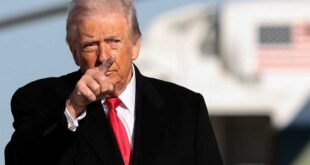Amjad Javeed
President Trump, hopefully outgoing, was not an out-and-out failure for his electorate. Yet, he was shown the door.
He had many feathers for his cap. Wages among the poorest quarter of workers rose by 4.7 per cent a year, small-business confidence attained a 30-year pinnacle. By restricting immigration and outsourcing, he sliced back jobs for his natives. He blocked China at every step to pander to sentiments of the China-bashing lobby.
His faux pas was desecration of American values of decency, tolerance, truthfulness and honesty. Without proof, he declared his adversary Biden corrupt. He viewed protest against killing of a black, Floyd `an orgy of looting and left wing violence’. He saw `left’ all around, even around ballot-counting staff.
He saw a cheat around. Pfizer with tardy vaccine-trial success announcement, the WHO chief by not naming `China virus’, and so on.
Rising-China threat
Mr. Trump was viscerally predisposed to viewing China as a looming military threat to peripheral countries, in general, and the USA, in particular. True, Mr. Biden is also viewed as an America Firster. True, China has been the fastest growing economy since 1979. Yet, it is nowhere near surpassing the USA even on one account that is gross Domestic Product, as is obvious from the table:
| Country | 1977 ($) | 1987($) | 1997($) | 2003($) | 2008($) | 2019 ($ tr.) |
| China | 843,097 | 1,883,027 | 3,706,647 | 6,187,983 | 8,908,894 | 14.4 |
| USA | 3,868,829 | 5,290,129 | 7,109,175 | 8,431,121 | 9,485,136 | 21.44 |
If nothing, the new president is expected to restore an element of decency to the White House
China much behind the USA in military prowess
China trails behind the USA in terms of expenditure on its defence forces and possession of actual military equipment. Despite ongoing modernization, China spends approximately $ 5 billion in arms export far below US exports of about $ 46.5 billion. China\s sales are about 3 per cent of global sales while the USA’s are about 79 per cent.
The US has over 8,000 operational and inactive warheads as against China’s 240 mostly non- deployed. The US has 2,000 nuclear weapons with strategic/intercontinental range compared with China’s twenty. US have sixteen ballistic missile submarines compared with China’s one, and more than 1000 US nuclear cruise missiles, compared with none for China.
The US has ten aircraft carriers plus one under construction attached to the Fifth and Seventh Fleet. China currently has two aircraft carriers, with a third in early construction, and a fourth planned for sometime in the mid 2020 or 2030s. Their first carrier, the Liaoning was commissioned by the PLAN in 2012, though it was first laid down in the early 1990s.
China’s critics
China critics in the USA are not monolithic. They have many shades including `Engagers’, `Realists’, `Duopolists’, ` China Lead’, `Declinists’ and so on.
The `Critics’ have an un-reconcilable antipathy toward China because of its repression of a wide spectrum of human rights (religious, labour, media and ethnic minority).
The `engagers’ look up for a common ground with China as a matter of national interest. The `engagers’ are optimistic that globalization, economic interdependence and rules of multilateral trade will lead to democratrisation in China.
`Realist engagers’ are convinced that China has learnt lessons from the collapse of former Soviet Union about the dangers of imperial overstretch. As such, China understands the realities of the current international system and limited capacity to change it.
`China Duopolists’ believe the USA and China could cooperate to bring into being a Chimerica (G-2), being the two most important countries.
The `China lead’ school believes China is already on the verge of replacing the USA as the world’s number-one power.
The `Declinists’ believe that demise of the US global leadership already occurred as `Washington consensus’ has been replaced by `. It is now Beijing, not Washington that is dictating new rules to govern the international economy.
Joseph Biden belongs to the `America Firster’ School that China can’t replace the USA as number-one, even if it tries to. After visiting China, Biden wrote `the United States has nothing to fear from China since it is far ahead of China in size of the economy, per capita income, scientific innovation, and educational excellence among other indicators’ (Biden, China’s Rise Isn’t Our Demise, New York Times, September 7, 2011, online ed.).
Global Leadership
At present, China lacks the soft and hard power to supplant the USA. To do so, China needs to:
(a) Command loyalty of the majority of the countries.
(b) Initiate, innovate and articulate policies, programmes and activities, including dispensing rewards and punishments.
(c) Being a `model’, worth emulating, of values, culture, language, laws, and social and political practices.
(d) Excel in soft-power resources such as educational and public-health systems
Inference
Biden is being welcomed as a whiff of fresh air, though he has no magic wand to change the climate and trade atmosphere. He has promised to rebuild America’s decrepit infrastructure, spend more on health and education, and ease immigration. . He has pledged to raise tax on firms and the wealthy.
He is no revolutionary though his policies are tilted to the left of what Trump did.
His job is to re-unite fractious American democracy. He is supposed to shun the personalized style of his predecessor’s rule, scorning decency and truth.
If Mr. Trump exits with grace, Joe’s job would be easier. If Trump makes transition difficult for Biden, the democrats may do tit for tat to Trump. Deprived of immunities, Trump’s tax accounts would be exposed to public scrutiny. And action by enforcement.
Joe understands China better than his predecessor. But, it remains to be seen how the USA would set right the topsy-turvy alliances that Trump had interwoven.
It would be hard for Biden to ignore the plight of minorities in India and the `imprisoned’ Kashmiris. Joe would have to balance strategic interests against conniving at human rights violations.
 Geostrategic Media Political Commentary, Analysis, Security, Defense
Geostrategic Media Political Commentary, Analysis, Security, Defense





